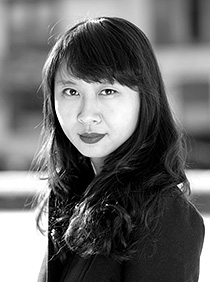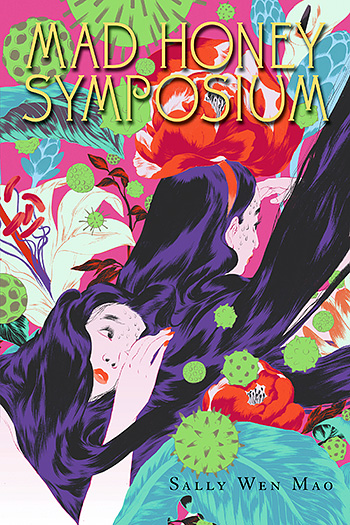Sally Wen Mao: A honey badger of a poet

Sally Wen Mao, MFA '13, had her first book of poems, "Mad Honey Symposium," published in May. Photo: Provided.
The fearless honey badger steals lions' prey and gobbles cobras for dinner. Tenacious and determined, it devours honeycombs despite countless bee stings. This is the totem animal of Sally Wen Mao, MFA '13, and an inspiration for her first book of poems, "Mad Honey Symposium," published in May by Alice James Books.
The title refers to honey made from rhododendron flowers, which are poisonous; the intoxicating honey can cause hallucinations and mild heart palpitations. Publishers Weekly described the book as conjuring "an absurd, lush, occasionally poisonous world and the ravenous humans and animals that travel through it."
The honey badger confronts danger as a mostly solitary figure, but unlike her totem, Mao's response to an uncertain world is to seek community wherever she goes.
As an undergraduate at Carnegie Mellon, she joined Kundiman, an Asian-American poetry organization and collective in which she remains active. She once described the group as "fiercer than a tiger on steroids and [knowing] no borders."
Cornell's MFA program gave Mao a good network of writers too, she says. In addition to the intimacy of the small program -- four poets and four fiction writers -- Mao also met people through the Creative Writing Program's Barbara & David Zalaznick Reading Series, such as guest speaker Catherine Chung, with whom Mao has become friends.

"Mad Honey Symposium" by Sally Wen Mao, MFA '13.
Mao decided to attend Cornell's MFA program after Kenneth McClane, the W.E.B. Du Bois Professor of Literature and Stephen H. Weiss Presidential Fellow, showed her around during a visit. She says they spent a great deal of time talking during her years at Cornell, both in class and out. "When it comes to being a poet, you have to tap into a lot, beyond the craft of writing itself," she says. "You have to talk about all these bigger human issues."
Mao's other mentors included her adviser, Alice Fulton, the Ann S. Bowers Professor of English, and Lyrae Van Clief-Stefanon, associate professor of English. At times Fulton, who studies feminist poetics, and Van Clief-Stefanon, a specialist in African-American literature, had different opinions on Mao's poems and their titles, which Mao says was extremely helpful. She credits their encouragement with enabling her to finish "Mad Honey": "It's very difficult to put together that first manuscript because you are gambling so much."
Mao says the differences in background histories and aesthetics of her MFA class, as well as of the professors, contributed significantly to conversations when poems and other writing were workshopped. She brought some of those conversations to her own students as a Cornell lecturer, such as in her "New Asian American Narratives" course, where many of her students had never read anything by an Asian-American author.
Her "Animated Fantasies" freshman writing seminar examined escapism, Japanese anime, animation and alternate imaginary universes. "It was interesting being able to teach why science fiction would appeal to minorities and people of color," she says, adding with a laugh, "If I had told my high school self that 10 years from now you'd be teaching at Cornell this stuff you're such a nerd about, I wouldn't have believed it. It was a really great experience."
"Mad Honey Symposium" won the 2012 Kinereth Gensler Award and was a finalist for the 2012 Tupelo First/Second Book Prize. Fulton says that reading Mao "is like taking hits of pure oxygen: I'm energized by audacious splendors of language coupled with a stunning intelligence and depth. The charged surfaces are matched by the feral power of Mao's subjects." (See Mao's poem, "Lessons on Lessening," below.)
Mao's work has been anthologized in "The Best American Poetry 2013" and is published or forthcoming in Colorado Review, Guernica, Gulf Coast, Indiana Review, Third Coast and West Branch, among others.
Linda B. Glaser is a staff writer for the College of Arts and Sciences.
Lessons on LesseningIn the rigmarole of lucky living, you tire of the daily lessons: Sewing, Yoga, Captivity. Push the lesson inside the microwave. Watch it plump and pop and grow larval with losses. Watch it shrink like shrikes when they dodge out of this palatial doom. On the sky's torn hemline, this horizon, make a wish on Buddha's foot. How to halve, but not to have -- how to spare someone of suffering, how to throw away the spare key saved for a lover that you don't have, save yourself from the burning turret with the wind of your own smitten hip. Do you remember how girlhood was -- a bore born inside you, powerless? How you made yourself winner by capturing grasshoppers and skewering them? You washed a family of newts in the dry husked summer, wetted them with cotton swabs before the vivisection. That's playing God: to spare or not to spare. In the end you chose mercy, and dropped each live body into the slime-dark moat. Today is a study in being a loser. The boyfriend you carved out of lard you left in the refrigerator overnight between the milk and chicken breasts. Butcher a bed, sleep in its wet suet for a night. Joke with a strumpet, save the watermelon rinds for the maids to fry in their hot saucepans. Open your blouse and find the ladybugs sleeping in your navel. Open your novel to the chapter where the floe cracks and kills the cygnet. Study hard, refute your slayer. -- Sally Wen Mao, MFA '13 From "Mad Honey Symposium" First published in Diode Poetry Journal |